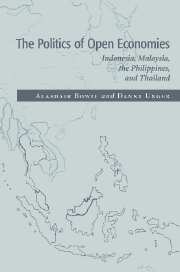5 - The Philippines
Published online by Cambridge University Press: 10 November 2009
Summary
The Philippines has been the East Asian capitalist laggard. Its economic performance after the 1950s, and particularly after the early 1980s, was consistently less impressive than that of the other commodity-rich economies of Southeast Asia. The country squandered an early head-start in its industrialization and, beginning in the 1960s, steadily lost ground relative to other East Asian developing countries. Yet, neither in the late 1940s nor in the early 1970s did observers expect the Philippines to fare less well economically than other regional economies. Its inferior performance resulted in considerable part from public policies, including ones that limited the economy's openness, that were motivated largely by distributional concerns and had the effect of retarding economic efficiency. In no other case considered in this book was the disjuncture between the interests of the dominant few and the policy requirements of sustained economic growth so sharp.
From 1950 to 1965, the Philippine government, a fairly stable democracy with regular alteration of parties in office, had controlled the Huk rural insurgency while keeping military spending at modest levels. Until the late 1950s, the country had one of the highest rates of economic growth in East Asia. In 1965, President Ferdinand Marcos, a gifted politician and lawyer, came to office apparently determined to overcome those obstacles that had begun to hinder Philippine economic growth in the late 1950s and to launch an economic takeoff. He appeared to some to be Manila's Park Chung Hee (the South Korean president who helped to launch his country's rapid growth in the early 1980s).
- Type
- Chapter
- Information
- The Politics of Open EconomiesIndonesia, Malaysia, the Philippines, and Thailand, pp. 98 - 128Publisher: Cambridge University PressPrint publication year: 1997



